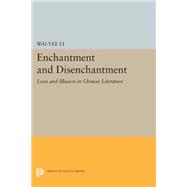
Enchantment and Disenchantment : Love and Illusion in Chinese Literature
by Li, Wai-YeeRent Textbook
Rent Digital
New Textbook
We're Sorry
Sold Out
Used Textbook
We're Sorry
Sold Out
How Marketplace Works:
- This item is offered by an independent seller and not shipped from our warehouse
- Item details like edition and cover design may differ from our description; see seller's comments before ordering.
- Sellers much confirm and ship within two business days; otherwise, the order will be cancelled and refunded.
- Marketplace purchases cannot be returned to eCampus.com. Contact the seller directly for inquiries; if no response within two days, contact customer service.
- Additional shipping costs apply to Marketplace purchases. Review shipping costs at checkout.
Summary
Li begins by defining the context of these issues through the study of an entire poetic tradition, placing special emphasis on the role of language and of the feminine element. Then, focusing on the "dream plays" by Tang Hsien-tsu, she turns to the late Ming, an age which discovers radical subjectivity, and goes on to explore a seventeenth-century collection of classical tales, Records of the Strange from the Liaochai Studio by Pu Sung-ling. The latter half of the book is devoted to a thorough analysis of The Dream of the Red Chamber, the most profound treatment of the dialectic of enchantment and disenchantment, love and enlightenment, illusion and reality.
Table of Contents
| Acknowledgments | |
| Abbreviations | |
| The Genealogy of Disenchantment | p. 3 |
| Fu Rhetoric and the Fictional Imagination | p. 10 |
| Fu Rhetoric and the Feminine Principle | p. 17 |
| The Topos of the Ambiguous Divine Woman | p. 23 |
| The Inward Turn of the Topos of the Ambiguous Divine Woman | p. 33 |
| The Progeny of the Ambiguous Divine Woman | p. 41 |
| The Late-Ming Moment | p. 47 |
| Comic Reconciliation in The Peony Pavilion | p. 50 |
| Detachment through Attachment in The Story of Nan-ko | p. 64 |
| The Ironic Vision of The Story of Han-tan | p. 69 |
| The Lyrical Solution in The Palace of Everlasting Life | p. 77 |
| The Philosophical Solution in Peach Blossom Fan | p. 81 |
| Enchantment, Disenchantment, and Self-Representation | p. 83 |
| Desire and Order in Liao-chai chih-i | p. 89 |
| The Confucian Solution to the Problem of Sensual Love | p. 89 |
| Pu Sung-ling and the Taming of the Strange | p. 92 |
| Metamorphosis and Desire | p. 100 |
| Desire and the Order of Formal Symmetry | p. 105 |
| Desire and the Logic of Ironic Inversion | p. 114 |
| The Internal Balance of Desire: Mediation and Complementary Heroines | p. 122 |
| The Structures of Order | p. 136 |
| Beginnings: Enchantment and Irony in Hung-lou meng | p. 152 |
| The Rhetoric of Illusion and the Difficulty of Beginning | p. 159 |
| Flaw and Supplement | p. 163 |
| Problems in Literary Communication | p. 175 |
| The Fate of a Rhetorical Figure | p. 179 |
| From Myth to History | p. 185 |
| The Illusory Realm of Great Void | p. 190 |
| Self-Reflexivity and the Lyrical Ideal in Hung-lou meng | p. 202 |
| Lust of the Mind | p. 203 |
| Stone as Narrator | p. 210 |
| Enlightenment through Love | p. 216 |
| Disenchantment and Order in Hung-lou meng | p. 231 |
| The World of the Precious Mirror of Love | p. 232 |
| The Confusion of the Mythic and the Magical | p. 242 |
| The Problem of Endings: Order and Return | p. 246 |
| Epilogue: The Compass of Irony | p. 257 |
| Works Cited | p. 269 |
| Index | p. 281 |
| Table of Contents provided by Blackwell. All Rights Reserved. |
An electronic version of this book is available through VitalSource.
This book is viewable on PC, Mac, iPhone, iPad, iPod Touch, and most smartphones.
By purchasing, you will be able to view this book online, as well as download it, for the chosen number of days.
Digital License
You are licensing a digital product for a set duration. Durations are set forth in the product description, with "Lifetime" typically meaning five (5) years of online access and permanent download to a supported device. All licenses are non-transferable.
More details can be found here.
A downloadable version of this book is available through the eCampus Reader or compatible Adobe readers.
Applications are available on iOS, Android, PC, Mac, and Windows Mobile platforms.
Please view the compatibility matrix prior to purchase.
